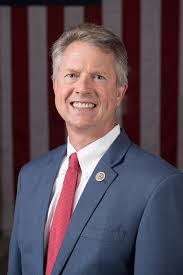Good morning everyone:
A relatively quiet week, but still somewhat busy. Frankly, we’re glad to be back in the friendly confines of home with Mrs. SSJ and our two pups, one of which ate a blue pen in our office and dragged ink across new carpeting — on National Pet Day of all occasions. The pup had blue paws for a while. Not the kind of problem one generally has to worry about at the Capitol. Lesson: Don’t leave the office door open at night. Now onto the significant stories we published last week and other news you may have missed but need to know…
- A look at top 50 bills and votes so far this session.
- State Rep. Steven Johnson announces his candidacy for state treasurer.
- Gov. Laura Kelly vetoes the latest tax bill. Override vote promised.
- The race for Kansas attorney general is starting to unfold.
- Adrienne Foster’s campaign for state Republican Party chair ended about as fast and suddenly as it started.
- The spat between Republicans and the governor over the future of a meditation room on the second floor of the budget is playing out in the state budget.
- A new administrative order issued by the Kansas Supreme Court erases some of the concerns voiced about how the state’s new emergency management law for COVID-19 related orders is applied.
- The Kansas State Board of Education asked the governor in a roundabout way to veto legislation requiring a civics test, a financial literacy course and development of a National Rifle Association-based firearm safety course for students.
- National Democratic Committeeman Christopher Reeves is leaving the post.
- Senate President Ty Masterson is not offering a promising outlook for a bill intended to provide school choice for at-risk students to attend private schools with public subsidies.
Ethics Commission fines senator
The state Governmental Ethics Commission recently fined Democratic state Sen. Cindy Holscher $200 for a self-reported political advertising violation.
The commission fined Holscher for including the “paid for” attribution at the end of — instead of before — two automated phone calls made during her Senate campaign last October.
The first call on Oct. 16 reached 1,999 live-answered individuals and 2,613 voicemails.

The second, which was made just to households in the California Trail Middle School area, reached 387 live-answered individuals and 570 voicemails.
Holscher said her campaign changed the message as soon as it realized the error and reported it to the ethics commission.
“We work very hard to adhere to all rules of campaigning,” she said in an email.
“In setting up these phone calls, we followed the standard of putting the campaign attribution at the end of the message.
“However, for this type of message, the attribute has to go at the beginning.
“As soon as the error was realized, we fixed the messaging and self reported to ethics. We regret the error and take full responsibility.”
Half the fine was to be waived if the remaining $100 was paid within 30 days of the date of when the fine order was mailed.
Brain injury funding
The new budget passed by the Legislature includes about $10 million in state general funds to cover an expanded population of Kansans with brain injuries who are receiving care in a more personal environment outside of a hospital setting.
The Legislature approved Gov. Laura Kelly’s amended budget recommendation to add money for this year and next for Medicaid services for patients with brain injuries.
The money for the program was not initially included in the governor’s recommended budget although an amendment adding the money was submitted in early March.
A couple years ago, the program was expanded from helping patients who suffered head injuries because of blunt force, such as a crash or a gunshot wound, to patients who suffered a stroke, aneurysm or a tumor.
The program also was expanded to include individuals ages 16 years and younger.
The new money rules out the need for a waiting list for Kansans in need of the services.
The Legislature expanded the program two years ago without adding money to cover the cost of the expanded populaton receiving Medicaid services for brain injuries.
Those services range from home-delivered meals to rehabilitation, speech, physical and cognitive therapies as well as transitional living skills.
As of August 2020, the program served 570 people, growing to about 740 by the end of January.
The population served by the program was growing at a rate of 4% a month as of last August.
The governor had indicated that without more money, the Kansas Department for Aging and Disability Services would have had to consider limiting the number of people with brain injuries who could have received services under the program.
The budget allocates $5.3 million from all funding sources, including $1.8 million from the state general fund, for the rest of the current fiscal year.
It also added $20 million from all funding sources, including $8 million from the general fund, for fiscal year 2022.
Car sharing economy
Gov. Laura Kelly last week signed groundbreaking legislation that could change the way we rent cars – or at least how we share them for money.
The law sets up a new regulatory framework allowing Kansans to share their vehicles, very much in the same way Airbnb lets you share your home.
The bill passed the House unanimously and 39-1 in the Senate.
Known as peer-to-peer car sharing, the bill clears the way for someone to share their car on a short-term basis – at a price, of course.
It’s all part of the sharing economy in the internet age where people are willing to loan everything — often for a price — from textbooks and clothes to even their chores to people they only know online.
Referred to as P2P car sharing in shorthand, the business model allows car owners to list their vehicles on an app similar to how you would find lodging on Airbnb.
The owner provides details such as the car’s make and model, mileage and year. A customer can then look up a car and sign up for one that meets their needs.
The model is seen as advantageous because it’s convenient for people who may not want or be able to afford a car but need more flexibility than what public transportation offers.
Colyer announcement
Former Republican Gov. Jeff Colyer is planning an announcement of “major campaign developments” Monday morning related to his campaign for governor.
The event is set for 10 a.m. Monday at the Capitol Plaza Hotel in Topeka.
This could very well be the endorsement that’s been expected from U.S. Sen. Roger Marshall, who received Colyer’s support during the 2020 Senate race.
Stay tuned.
Lobbyist spending bottoming out
With the pandemic scaring people away from gathering in groups this year, lobbyists could end up spending a record-low sum this year.
The latest report from the State Ethics Commission shows that lobbyists spent about $83,400 in the first two months of this year, the lowest amount in at least 18 years and, perhaps, maybe at any time in anyone’s memory.
By comparison, lobbyists spent $458,330 for the first two months of 2020, $453,521 in 2019 and $367,432 in 2018.
The only year that’s even close to this year’s dramatic dropoff is 2004, when $224,774 was spent on lobbying in January and February.
The leading spender so far in 2021 is the Kansas Bankers Association, which laid out about $13,150 in two months as it pushed for passage of a bill creating a low-interest loan program for businesses struggling from the economic fallout of the pandemic.
The bill also allowed banks to deduct interest income from agricultural loans and single-family housing loans in rural areas with populations of fewer than 2,500 people outside a metro area. It also expanded the geographical area that credit unions can serve.
Gov. Laura Kelly signed the bill into law after vetoing basically the same legislation last year when some tweaks were made this year.
Americans for Prosperity was second in January and February at about $6,916 followed by the Kansas Beer Wholesalers Association at nearly $5,200.
Cox Communications spent $3,605, while Everytown for Gun Safety Action Fund laid out about $3,445.
New stalking law
Gov. Laura Kelly last week signed a bill into law that imposes tougher penalties for stalking a minor and closes a loophole that could make it easier to dodge a conviction.
The bill came in response to the case of a former Olathe elementary school teacher who was charged with stalking a young female student in Johnson County.
Detectives found hundreds of pictures and more than two dozen videos of the girl on the teacher’s phone and iPad when they conducted a search with his permission.
The new law increases the stalking of a minor to a felony and removes a provision requiring victims to know they were being stalked.
“The current statute does not clearly spell out whether a victim needs to be aware of the stalking at the time of the acts in order to be in violation of the law,” Johnson County District Attorney Steve Howe told lawmakers in written testimony.
Howe said the former teacher unsuccessfully tried to have the charge dismissed in district court on the grounds that the victim would have had to have known about the alleged conduct.
He said there was no guarantee the prosecutors could defeat the argument in the appellate courts.
“It is therefore essential that we close this potential loophole to ensure protection of our children from this type of criminal behavior,” he said.
New FEC reports
Democratic Congresswoman Sharice Davids picked up where she left off during the last election cyling, piling up money like the U.S. Mint.
Davids reported raising $540,168 for the first quarter of this year and had $775,283 on hand at the end of the quarter on March 31.
Davids raised more than any member of the U.S. House from Kansas.

Davids’ potential rival, Republican Amanda Adkins, raised $654 in the first three months of the year, with $30,371 on hand at the end of the quarter.
Of course, Adkins is not guaranteed the nomination, since there’s been lots of talk that Republican state Rep. Chris Croft is looking at running for the GOP congressional nomination in the 3rd District as well.
Across the state, here’s how congressional fundraising shook out in the first quarter:
1st District Congressman Tracey Mann: Raised: $201,063, $426,338 on hand.
2nd District Congressman Jake LaTurner: Raised $208,276, $194,430 on hand.
4th District Congressman Ron Estes: Raised $272,466, $954,566 on hand.
Marshall & hate crimes
U.S. Sen. Roger Marshall last week defended his vote against moving ahead with debate on a bill speeding up Justice Department review of hate crimes against the Asian American community.

Marshall joined Sens. Ted Cruz of Texas, Josh Hawley of Missouri, Rand Paul of Kentucky, Tommy Tuberville of Alabama and Tom Cotton of Arkansas in voting against moving forward with the bill in the Senate. The vote on the bill was 92-6.
Marshall told The Associated Press that an “existing federal hate crimes law already prohibits intentionally injuring or trying to injure others based on their race, color, religion or national origin.”
Here’s more coverage from KSNT in Topeka.
Transgender athletics legislation
Lots of news to report on as anticipation builds that Democratic Gov. Laura Kelly will veto the Fairness in Women’s Sports Act, which would ban transgender girls and women from participating in interscholastic sports for females.
- From Kansas News Service: Gov. Kelly signals her intent to veto the bill, although she stops short of saying just that. She calls the bill a “job killer.” She’s widely expected to veto the bill.
- From The Associated Press: Alabama last week joined the small group of states that have passed bills preventing transgender girls from playing on female sports teams. The legislation bars K-12 schools from letting a “biological male” participate on a female team. The bill now goes to Alabama Gov. Kay Ivey.
- From The Associated Press: Add North Dakota to the list of states passing bills similar to the one that’s already passed in Kansas. Nine state legislatures, including Kansas, have now passed similar legislation. The bill that passed in South Dakota was vetoed by the state’s conservative Republican governor, and the Idaho law was blocked in court and is now on appeal.
- From WTRF in Wheeling, West Virginia: Gov. Jim Justice said he plans to sign that state’s bill or let it become law. More coverage from The Hill newspaper.
- From the Austin American-Statesman: The Texas Senate passed a bill last week placing limits on transgender athletes.
- From The Tampa Bay Times: The Florida House passed a bill last week banning transgender athletes from women’s and girls’ scholastic sports.
- NCAA suggests it may pull events: Last week, the NCAA strongly suggested it might cancel championship events where hosts can commit to providing an environments “free” of discrimination. The annoucement was relevant for Kansas because the NCAA haas schedule to hold the first and second rounds of the 2025 Division I men’s basketball championship and 2024 NCAA Division II wrestling national championships. The NCAA annoucement had ripple effects in Florida, Misssouri, Texas and Tennessee among others.
- From The Washington Post: A look at the Women’s Sports Policy Working Group, which portrays its proposals as a “science-based compromise” between those who want to ban transgender athletes outright and advocates who want full inclusion. Here’s the coverage froom The Post.
Pompeo under fire
Former U.S. Secretary of State Mike Pompeo came under more heat last week when a new government watchdog report revealed that he violated federal ethics rules by asking State Department employees to undertake personal chores.

The agency’s inspector general “found that both Secretary and Mrs. Pompeo requested that the political appointee and other employees in the Office of the Secretary undertake
work of a personal nature, such as picking up personal items, planning events unrelated to the department’s mission, and conducting such personal business as pet care and mailing personal Christmas cards,” the report states.
“OIG found that such requests were inconsistent with Department ethics rules and the Standards of Ethical Conduct for Employees of the Executive Branch.
“However, with only a few exceptions, OIG did not find that Secretary and Mrs. Pompeo made personal requests to the special agents in the Bureau of Diplomatic Security who were protecting them. These agents generally told OIG that the Pompeos did not
ask them to undertake tasks of a personal nature.”
Here’s last week’s coverage of the report from USA Today, The New York Times via the Seattle Times, NBC News and Fox News.
Davids’ political tree sprouts
The husband of Congresswoman Sharice Davids’ district director last week announced he was running for Prairie Village City Council.
Cole Robinson, the husband of Danielle Robinson, announced his City Council candidacy on Twitter last week.

He posted pictures when he filed, accompanied by his wife and kids.
“My wife & I chose to raise our kids in Prairie Village & filing for office was a family affair! As your rep, I’ll work hard for your family to make sure PV remains a special place to live, now & in the future.”
Cole Robinson is seeking a seat that will come open with an incumbent’s decision not to run again.
It remains to be seen whether Robinson can match the fundraising prowess of his wife’s boss.
STAR Bonds
Gov. Laura Kelly last seek signed a bill extending the STAR bonds tax incentive until 2026 with a number of new features.
The bill adds new business headquarters to the types of facilities eligible for the incentive.
The bill also adds a “rural redevelopment project” to the list of eligible projects for STAR Bonds.
A rural redevelopment project is defined as one that’s not in a city with a population of more than 50,000; has regional importance; has a minimum of $3 million in capital investment; and would enhance the quality of life in the community and region.
The bill also adjusts the eligibility requirements for a project by increasing the minimum required capital investment and projected gross annual sales amounts from $50
million each to $75 million each.
It also requires a minimum capital investment and annual gross sales of $40 million for a project in a metropolitan area between 50,000 and 75,000 and is deemed of high value by the commerce secretary.
The Senate passed the bill 30-9. It was passed in the House 101-23.
Angel investors
Gov. Laura Kelly last week signed a bill extending the economic development incentive for small, innovative startup companies for five years, until 2026.
The bill increases the tax credits received from an investment in a single business to $100,000 from $50,000. It also increases the total yearly tax credits received for an investor to $350,000 from $250,000.
The bill passed the House on a 109-12 vote. The Senate passed the bill 29-9. The governor has signed the bll into law.
Farewell, sort of
This is the second time we are offering a warm send-off to Johanna Warshaw, who has served as U.S. Rep. Sharice Davids’ spokeswoman for the last couple of years.

Warshaw, a University of Missouri graduate, is leaving the congresswoman’s office to go to work for the Democratic Congressional Campaign Committee as a regional press secretary.
She won’t be far away. She’ll be working on Kansas House races, including Davids’ campaign for a third term representing the Kansas City suburbs.
“Johanna is a rock star – excited to work with her in this new capacity,” tweeted Danielle Robinson, district director for Davids.
We got to know Warshaw when she capably served Laura Kelly’s campaign for governor and later in the governor’s office after Kelly was elected.
New court administrator
Th state Supreme Court last week named Stephanie Bunten as the next judicial administrator, the state’s highest-ranking nonjudicial position in the court system.
Bunten will succeed Nancy Dixon, who retired April 16 after 10 years in the position.
Bunten most recently worked as chief financial officer for the courts, a position she’s held since 2015.
Earlier, she served as assistant fiscal officer for the court and as a research attorney for a Court of Appeals Judge Henry Green.

In between her terms with the court system, she was a tax accountant for Mize Houser & Co., PA, in Topeka.
Bunten earned a law degree from Washburn University and a bachelor’s in business administration from Washburn as well.
The judicial administrator’s responsibilities include overseeing fiscal operations, information systems, personnel, caseload statistics reporting, public information and attorney services.













